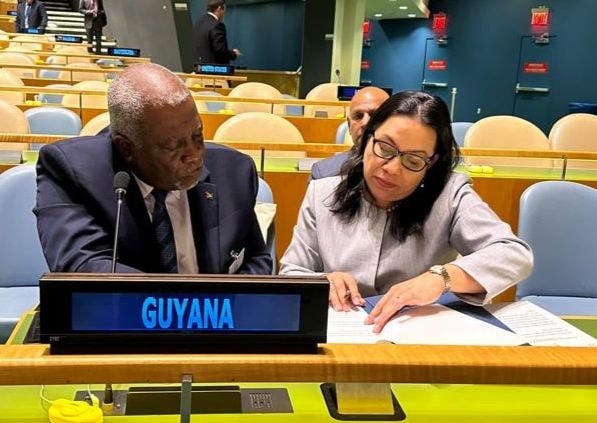
Guyana presses for speedy establishment of Loss and Damage Fund to aid climate-vulnerable countries
An agreement to establish a Loss and Damage Fund was, for many, the highlight of the United Nations Climate Conference – COP27 – and the culmination of decades of pressure from climate-vulnerable developing countries like Guyana.
The fund aims to provide financial assistance to nations most vulnerable and impacted by the effects of climate change.
Six months after the agreement was reached by world leaders in Egypt, Guyana’s Prime Minister, Mark Phillips, has called for the speedy establishment of the financing arrangement.
Phillips was at the time addressing a high-level meeting at the United Nations Headquarters in New York on Thursday, intended to review the Sendai Framework for Disaster Risk Reduction (2015-2030).
“We also look forward to the speedy establishment of the Loss and Damage Fund, which will be critical for those most vulnerable and impacted by the effects of climate change. We also call for the $100 billion per year commitment to be urgently implemented,” Phillips said in his statement to the gathering.

While the historic decision was welcomed, this is but the first step and success will depend on how quickly this fund gets off the ground.
Representatives from 24 countries are tasked with working together this year to decide what form the fund should take, which countries should contribute, and where and how the money should be distributed.
Beyond that, the Prime Minister pointed out on Thursday that the classification of many Small Island Development States (SIDS) as ‘middle-income’ has impeded access to concessional financing, which is critical for overall development including building resilience.
“We, therefore, look forward to the early completion of the United Nations Multidimensional Vulnerability Index (MVI), which will objectively determine our countries’ vulnerability and resilience – and go beyond the narrow criterion of GDP for the allocation of financial support for developing countries,” the Guyanese leader reasoned.
Notwithstanding, Phillips said countries in Latin America and the Caribbean (LAC), many SIDS, have made significant progress in disaster risk reduction in recent years, with many countries implementing policies and programmes to reduce vulnerability and build resilience.
However, he posited that more needs to be done to address the underlying risk drivers that contribute to disasters in our region. This includes promoting sustainable development and addressing the impacts of climate change.
“International cooperation and support are critical for reducing vulnerability to disasters. This includes providing financial and technical assistance, sharing best practices, promoting knowledge exchange and capacity building,” Phillips lobbied.
The United Nations Framework Conventions on Climate Change (UNFCCC) reports on low coastal states’ vulnerability to climate change highlights the significant risks faced by these Small Island Development States as a result of rising sea levels, increased frequency and intensity of storms and hurricanes, and other impacts of climate change.
The reports emphasize the need for international cooperation and support to address these challenges and promote resilience in vulnerable communities.
And since the adoption of the Sendai Framework, Phillips said Guyana has made some progress in implementing DRR measures; pointing to the Low Carbon Development Strategy 2030 which deals with building resilience to the impacts of climate change, improving disaster risk management, and promoting adaptation measures in vulnerable communities.





